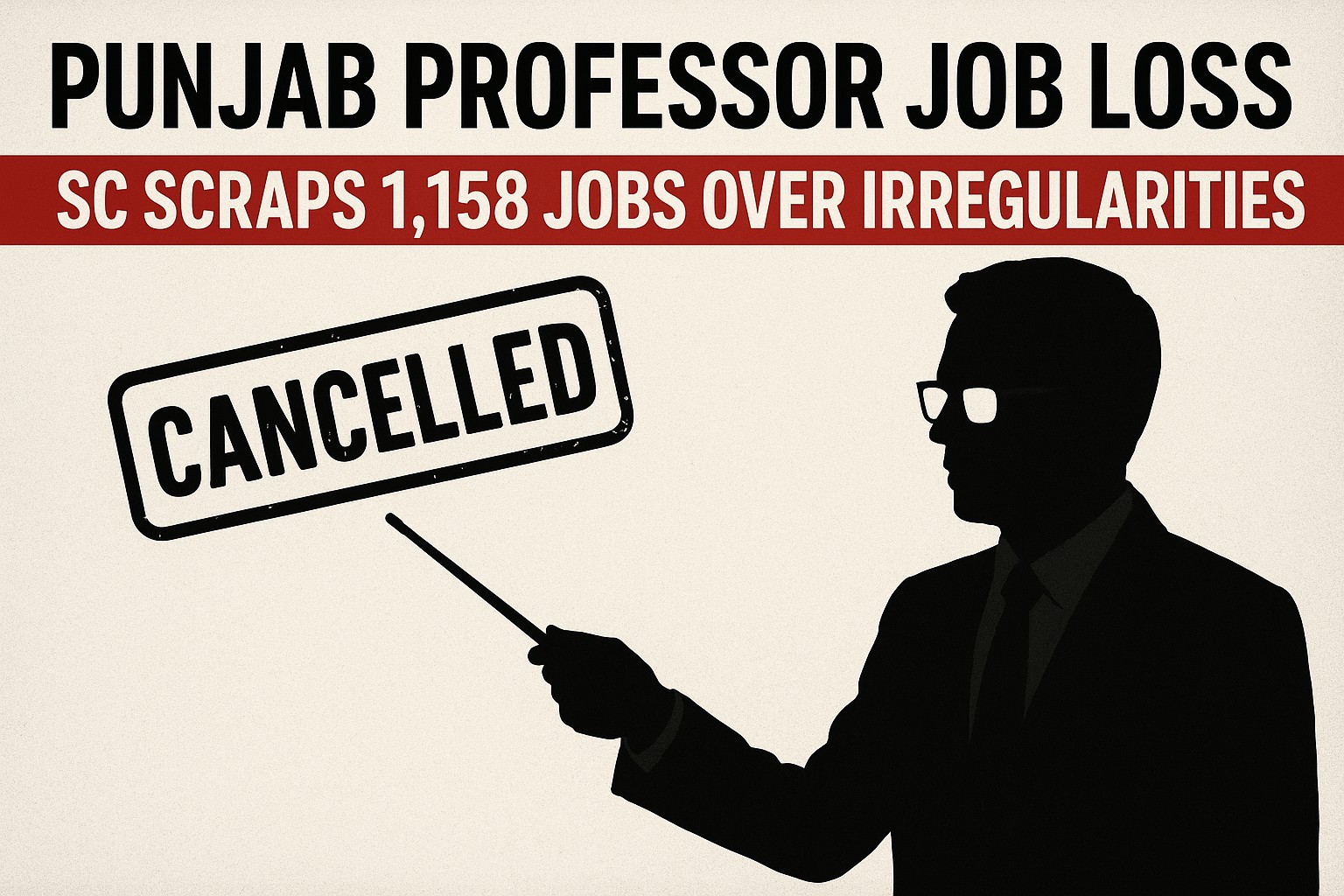Punjab professor job loss has made headlines after the Supreme Court of India scrapped the recruitment of 1,158 professors and librarians in Punjab. The decision, based on a flawed recruitment process, has shaken the education sector in the state, leaving many professionals devastated and raising questions about the political interference that may have influenced the flawed process. This move has sparked debates over transparency, political involvement, and the future of educational recruitment in Punjab. Let’s break down the Supreme Court’s ruling and its implications.
Punjab Professor Job Loss: What Led to the SC Ruling?
The Punjab professor job loss stems from a Supreme Court verdict that scrutinized the recruitment process for assistant professors, librarians, and other academic positions in the state. After prolonged legal battles, the Supreme Court concluded that the process was marred by significant procedural flaws and irregularities, which led to the scrapping of these appointments.
The petitioners pointed out the glaring inconsistencies in the recruitment procedure, such as the questionable influence of political factors. The case highlighted that the appointments might have been manipulated for political gain, rather than adhering to merit-based hiring practices. As a result, the court ruled to annul the jobs of 1,158 candidates, a move that has shocked the academic community in Punjab.
Political Gains and Impact on Recruitment
One of the key factors contributing to this Punjab professor job loss was the involvement of political considerations in the recruitment process. The Supreme Court mentioned the political influence in the appointments, which led to the undermining of the merit-based system that should have been followed in educational hiring. This interference raised questions about the integrity of the recruitment process, leading to widespread concern over how political favoritism might have influenced job selection in various educational institutions in Punjab.
This has led to a larger conversation about how recruitment in government and public sector positions should be handled to ensure fairness, transparency, and equal opportunity for all candidates. The Punjab professor job loss has made it clear that stricter regulations and oversight are necessary to avoid the manipulation of hiring processes for political gain.
Key Takeaways from the SC Verdict on Punjab Professor Jobs
-
Procedural Flaws: The court found that the recruitment process did not adhere to proper procedures and was riddled with inconsistencies.
-
Political Interference: Political involvement in the hiring process was cited as a major reason for the flawed recruitment, leading to accusations of bias and favoritism.
-
Job Loss for Thousands: Over 1,100 job positions were annulled, affecting thousands of aspirants who had anticipated their careers in academia.
-
Calls for Transparency: The case highlights the need for greater transparency in the recruitment process, especially for government positions.
Aftermath of the Punjab Professor Job Loss Decision
The Punjab professor job loss ruling has had a far-reaching impact on those affected. Many of the professors and librarians who had been appointed through the flawed process now find themselves without jobs and facing an uncertain future. These candidates, some of whom had worked for several years in academic settings, are now left with no recourse but to explore other job opportunities.
This verdict has also raised concerns among other public sector employees who fear that similar issues could arise in their recruitment processes. The ruling serves as a reminder of the importance of conducting fair and transparent hiring processes in all sectors, ensuring that political influence does not interfere with the careers of qualified professionals.
The Way Forward: Reforms Needed in Recruitment Practices
In light of the Punjab professor job loss, there is a pressing need for reforms in recruitment practices. Transparency, fairness, and a clear merit-based approach must be the cornerstone of hiring in government positions. The role of political interference should be minimized to ensure that qualified candidates are selected based on their skills and qualifications, not their political affiliations.
To learn more about how similar recruitment issues have impacted the educational system, check out this article on recruitment reforms.
Conclusion
The Punjab professor job loss is a significant case in the ongoing battle for merit-based recruitment and transparency in government hiring processes. The Supreme Court’s decision has emphasized the need for reforms and highlighted the consequences of political interference in public sector recruitment. As this case unfolds, it will likely serve as a catalyst for much-needed changes in the recruitment process in Punjab and beyond.
The Punjab professor job loss also serves as a wake-up call for educational institutions to adopt a more rigorous and fair approach when hiring faculty members. Moving forward, it is crucial for all recruitment processes to be free of political influence to ensure that only the most qualified candidates are given the opportunity to serve in public sector roles.


